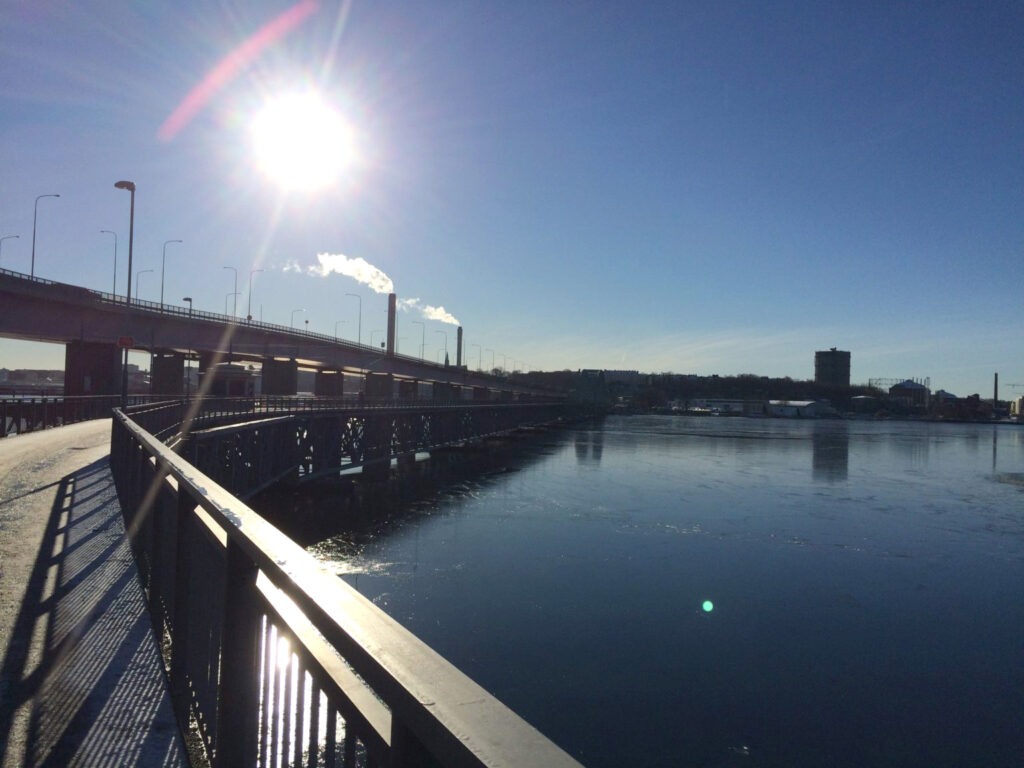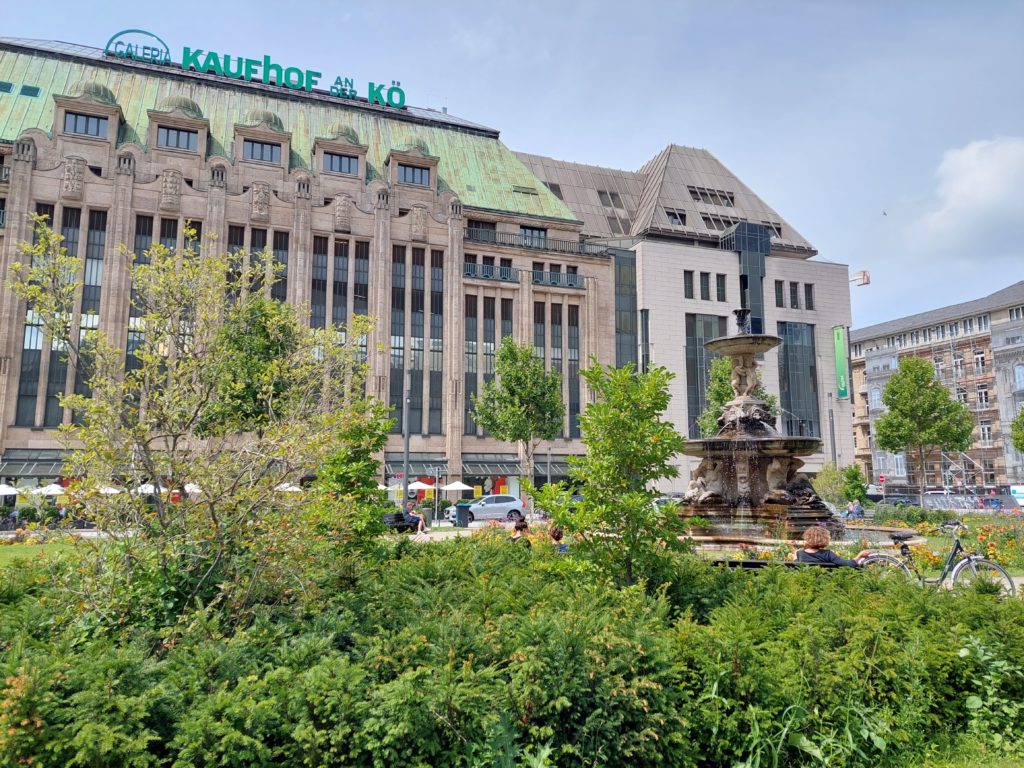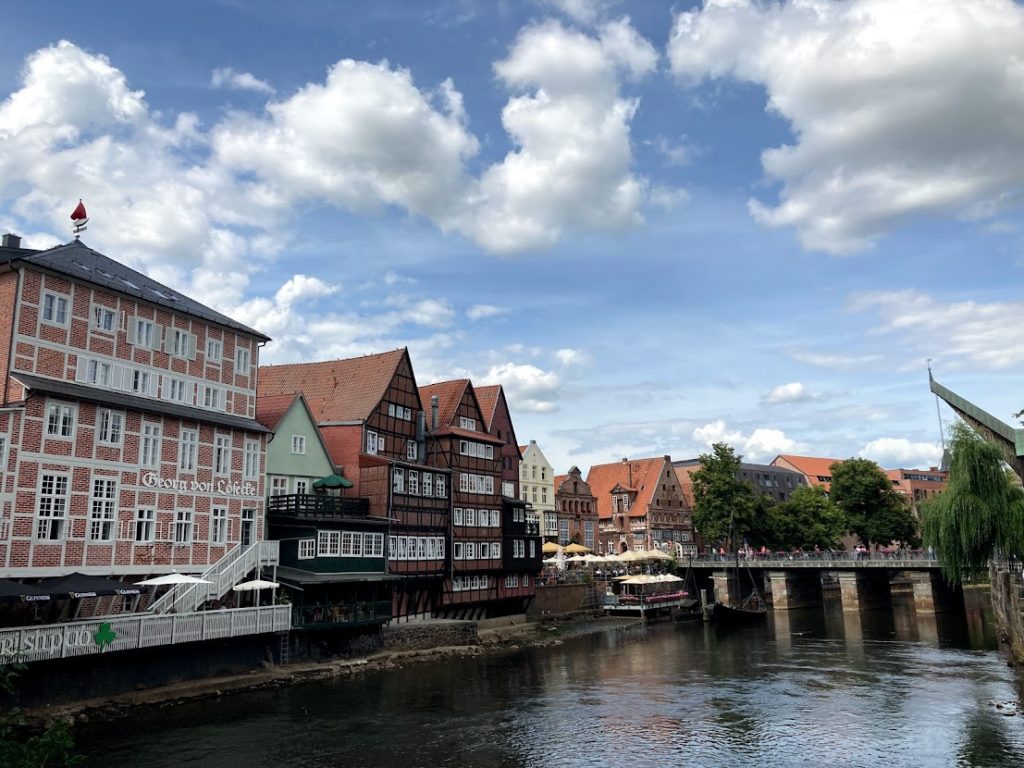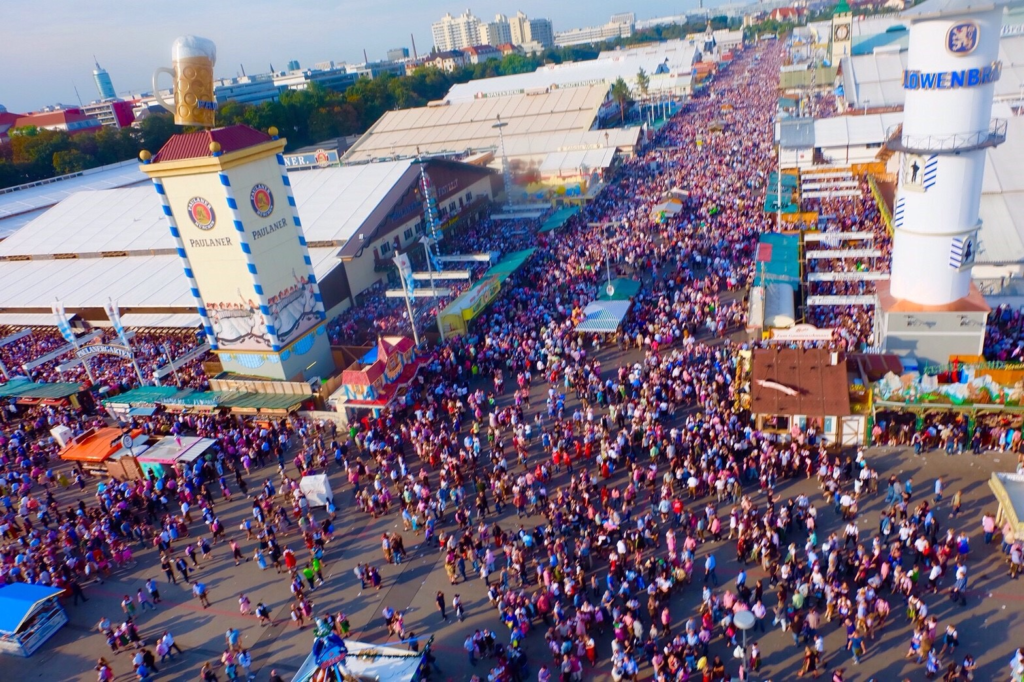Germany offers great opportunities for those looking for work at Japanese companies and/or in Japanese-speaking positions in Europe. When deciding where to potentially work in Germany, the location of the company or university, characteristics of the city in question are all important factors to consider.
In this article we select five of Germany’s largest cities with Japanese consulates /presence) and explain why we recommend them.
Düsseldorf
Finding a job
★★★★★
Rent
★★★
Access
★★★★★
Japanese residents, communities, and culture
★★★★★
First out is Dusseldorf; with a population of 600,000 people, Düsseldorf is one of the most populous cities in the NRW (Nordrhein-Westfalen) region, and is often referred to as “Little Tokyo”, since it has the largest Japanese community in Europe. Although the city itself may not look like much as it is “only” the 7th most populous city in Germany, the so-called “NRW Economic Region” as a whole has a population of about 20 million, making it the largest in Germany.
According to the Ministry of Foreign Affairs’ “Survey of Japanese Residents Abroad” as of October 2017, there were 14,885 long-term Japanese residents in Dusseldorf (as in many other cities, the number of Japanese in the city is actually higher, as there are also short-term residents and people who are not registered), making Dusseldorf the most Japanese-populated city in Germany. This means that although Dusseldorf is not a large city, it also has a high concentration of Japanese companies and offices as well as Japanese shops and restaurants in the city centre.
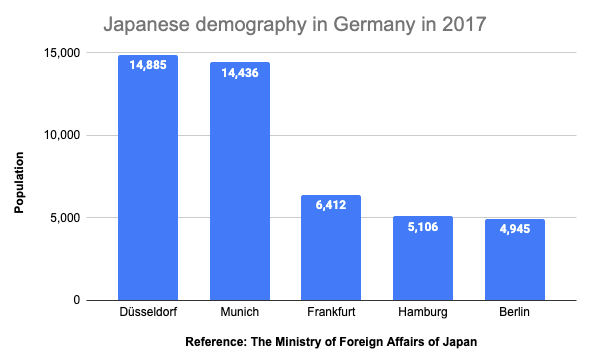
Finding a job
As the “home of Japanese companies”, it is unparalleled in Europe when it comes to the ease of finding jobs at Japanese companies, and naturally, the process of applying and interviewing for a job is one of the smoothest there is.
Rent
Rents in Dusseldorf are around 13-14€ per square metre, which is about mid-range for Germany. However, Dusseldorf also consists of suburban areas, where it is possible to find cheaper flats with access to the city centre by tram or metro.
Access
With Cologne, a metropolis of one million people, Bonn, the former capital of West Germany, and the industrial cities of Essen and Dortmund all within half an hour to an hour’s train journey away, Dusseldorf is one of Germany’s best locations in terms of access to other cities.
With over 20 million passengers per year, Dusseldorf Airport is Germany’s third-largest international airport and offers direct flights to Japan as well as access to major European and international cities such as London, Vienna, New York, and Singapore, although this may have changed a bit since and due to the corona pandemic. Short-haul and low-cost flights to smaller European cities are also available from the neighbouring cities of Dortmund and Cologne.
Japanese residents, communities, and culture
Being the largest Japanese community in Europe, there is no shortage of Japan-related communities, events, grocery shops, Japanese restaurants, and language partners.
As of 2019, the number of Japanese living in Dusseldorf is estimated to be around 5,000 to 6,000, and the city is home to a diverse range of Japanese groups, including Japanese expatriates, working holidaymakers, international students, and locally employed people. There are many Japan-related buildings and restaurants throughout the city, as well as “Japanese gardens” and “Japanese spas” – otherwise rarely seen in other European cities.
Frankfurt
Finding a job
★★★★
Rent
★★
Access
★★★★★
Japanese residents, communities, and culture
★★★
With a population of around 800,000, Frankfurt is one of the five largest cities in Germany. Despite not being the biggest city in Germany, it has become the country’s financial centre and the most multicultural city, while also housing Germany’s largest airport.
Finding a job
Frankfurt is also home to a large number of Japanese companies and, although not as large as Dusseldorf, is one of the easiest places for Japanese people to find work.
Rent
Rent in Frankfurt is around 15-16€ per sqm, which is the second-highest in Germany after Munich. Therefore, you should be prepared to pay 10-20% more in rent than in other cities.
Access
Frankfurt Airport is, with 70 million passengers a year, the largest airport in Germany – in fact, it has almost three times as many passengers going through it as Dusseldorf Airport. When direct flights between Dusseldorf and Japan were cancelled due to the Corona pandemic, the Frankfurt-Japan service still continued to operate without interruption.
Although it does not have an as large metropolitan area nearby as Dusseldorf, Frankfurt is perfectly situated between Dusseldorf and Munich, at the navel of West Germany, with easy access by train to other large cities such as Nuremberg and Stuttgart.
Japanese residents, communities, and culture
The Japanese community in Frankfurt may not be as large as the one in Dusseldorf, yet, Frankfurt is home to a large number of Japanese people and there is no shortage of communities, language partners, and Japanese restaurants. Frankfurt is also a multicultural city and many Germans are interested in Japanese culture, which makes it a more friendly and accepting place to reside or work.
As of October 2017, there were 6,412 long-term Japanese residents in the city, which is less than in Dusseldorf and Munich, but enough to become the third-largest community in Germany.
There is also a Japan-related event called the Main Matsuri, which started as a pilot in 2018.
The festival is held in August on the east side of the Main River under the theme “Musik, Essen, Kulture” and has been so successful that it was continued the following year. The festival will also be held in 2022, subject to regulations. The festival is sponsored and recognised by major Japanese companies such as Nissin Foods and ANA.
However, unfortunately, Frankfurt has the highest crime rate out of all the major German cities, so you may need to be a bit cautious in certain areas of the city.
Hamburg
Finding a job
★★★
Rent
★★★
Access
★★★
Japanese residents, communities, and culture
★★★
With a population of 1.8 million, Hamburg is the second-largest metropolitan area in Germany. One in six in Hamburg is a foreigner, making it one of Germany’s most multicultural cities, and you can therefore expect to find both international companies and restaurants all over the place.
Finding a job
It is more difficult for Japanese people to find work in Hamburg than in Dusseldorf and Frankfurt as there are not as many Japanese companies operating there. However, as mentioned above, there are many multinational companies from a variety of different backgrounds, so if you are confident in your English and/or German, you can expect to find work in either American and/or German companies.
Rent
For a big city, the rent level is relatively reasonable. The market price per sqm is around 13-14€, which is about the same level as in Dusseldorf.
Access
As Hamburg itself is an independent economic zone, access to other large cities is not as convenient as in other areas of Germany. Due to its location between the west and the east of Germany, it takes around two to three hours by train to get to Berlin or Düsseldorf.
Hamburg Airport is the fifth-largest airport in Germany with 17 million passengers per year. Unlike Dusseldorf and Frankfurt, there are no direct flights to Japan, so if you want to go there you have to travel to either Dusseldorf or Frankfurt first.
Japanese residents, communities, and culture
As mentioned above, Hamburg is a multicultural city where one-sixth of the population are foreigners and one-third of the residents have an immigrant background, making life there as a Japanese person relatively easy to get into.
As of October 2017, there were 5,106 long-term Japanese residents in the city, making it the fourth largest of the cities featured in this article.
Compared to other cities such as Dusseldorf, there is a lack of notable Japanese communities and events, but there are still some places, events, and communities, such as the Japanese Film Festival, that are worth visiting.
Hamburg developed as a port city and areas therein have been declared UNESCO World Heritage Sites in 2015 (the brick warehouse district adorning the canals). Hamburg is unique among German cities since while being a waterfront city it also opens up to a large river connected to the sea. Hamburg is also home to Fischmarkt, which is a great place for Japanese people to buy fish and other fresh produce. The city also has a thriving music culture and has produced famous musicians such as Brahms and Mendelssohn.
Reference:【ドイツ最大の港】ハンブルクの日本人の仕事と私生活について(Japanese)
Munich
Finding a job
★★★
Rent
★
Access
★★★
Japanese residents, communities, and culture
★★★
With a population of 1.4 million, Munich is the third most populous city in Germany after Berlin and Hamburg. It is considered to be the “Bayern”, or “most German”, a cultural area in Germany, and many of the things we think of when thinking about Germany, such as Oktoberfest and German folk costumes, originated in Munich.
Finding a job
Alongside Dusseldorf and Frankfurt, Munich is also home to many Japanese companies. As the third most populous city in Germany, there are many options for job seekers, and Munich is one of the easier cities to find and land a job. However, Munich has a large number of Germans who speak German with a Bayern accent, which can make it difficult to communicate in German.
Rent
Rents in Munich are the highest in Germany, at a level of 18-19€ per sqm. Because it is a big city, there are plenty of places to live, but you should be prepared to pay around 700-1000€ per month.
Access
Due to its location near the southernmost tip of Germany, the city is somewhat isolated from the rest of the country. For example, it is closer to Zurich, Vienna, and Prague than to Berlin and Dusseldorf, making it easier to travel outside of Germany than within.
Munich Airport is the second-largest airport in Germany with nearly 50 million passengers per year and it does have direct flights to Japan (the flight schedules may have changed somewhat due to the pandemic). The airport also offers flights to other major European and international destinations, making it one of the most convenient airports in Germany.
Japanese residents, communities, and culture
As of October 2017, there were 14,436 long-term Japanese residents in the city, making it the second most Japanese-populated after Düsseldorf. In line with the Bavarian region’s concentration of high-tech industries, Japanese companies have also established themselves in the manufacturing industry. According to the “Survey of Japanese Residents Abroad” published by the Ministry of Foreign Affairs of Japan in October 2017, there are 702 Japanese companies registered with the Consulate General in Munich, more than the 622 companies in Düsseldorf.
The University of Munich has a department of Japanese studies and Munich is one of the most “pro-Japanese” cities in Germany. Japanese restaurants and food shops can be found in the city, although not as many as in Dusseldorf, and it is easier to find Japan-related communities than in other smaller cities.
Berlin
Finding a job
★★
Rent
★★★
Access
★★
Japanese residents, communities, and culture
★★★
Berlin, the home of approximately 3.5 million people, is the capital of Germany. Berlin is the political centre of the country and the largest cosmopolitan city in the world, with one-fifth of the population being foreign. Yet, in recent years, one in ten of the population is unemployed, and inequality and discrimination, etc., have led to a rise in crime and social problems.
Finding a job
Despite being the capital, there are actually not that many Japanese companies operating in Berlin. Companies and industries with Japanese or Asian connections are mainly concentrated in western Germany, which makes it somewhat more difficult for Japanese people to find work in Berlin than in other major cities.
Rent
Rents in Berlin are actually fairly reasonable, being cheaper than in both Munich and Frankfurt, at around 14-15€. However, Berlin is a large city and prices are naturally higher in the centre, so many residents choose to live in the slightly outlying areas.
Access
Berlin is the capital of Germany, but accessibility is not as good as it could be. First of all, the city itself is large and it is not easy to get to the city centre itself in order to connect to the main transportation links.
Furthermore, Berlin Airport is only the fourth largest in Germany and there are no direct flights to Japan. Therefore, if you want to go to Japan, you will have to travel to Frankfurt or another airport.
Japanese residents, communities, and culture
As of October 2017, there were 4,945 long-term Japanese residents in Berlin, making it the fifth-largest city in this article (fifth may seem low, but there are still close to 5,000 Japanese living in the city). The Japanese community is accordingly well represented, and the Japanese Chamber of Commerce and Industry in Berlin (Japanische Industrie- und Handelsvereinigung in Berlin e. V.) provides support for business between Japan and Berlin.
In the city, there is a lot of interest in Japan, partly due to the fact that two of Berlin’s universities have Japanese studies departments. As a multicultural city, there are also a number of Japan-related communities and events, but these are inferior to those in Düsseldorf.
The crime rate is the second-highest in Germany after Frankfurt – something foreigners ought to be mindful of.
References:
